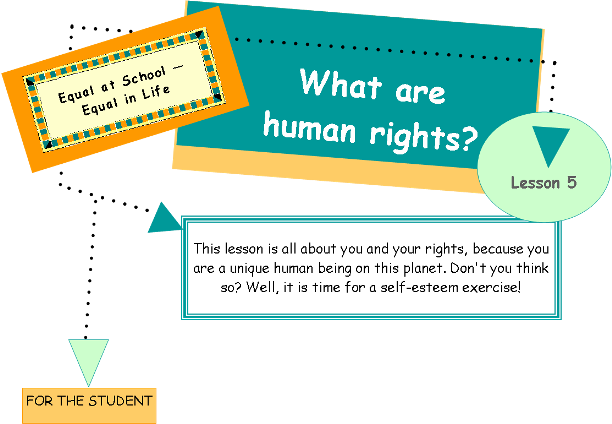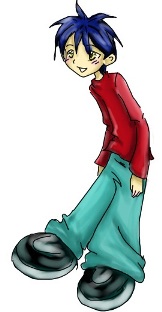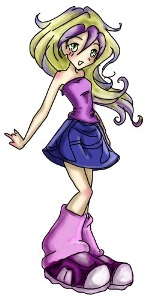What are human rights?

Today I saw at school a black and white poster saying "All Different - All Equal". What was it about? I'm curious and read the smaller letters under the sign and understood that after the classes there will be shown a movie on human rights. I didn't pay much attention at first as it sounded somewhat boring. But then I decided that a future explorer can't miss the chance to see something new. But what attracted me most was a short text named "Important: I'm Special". Have you read it? If you haven't look at it below: |  |
Important: I'm Special author unknown I'm special, in all the world there's nobody like me. Since the beginning of time, there has never been another person like me. Nobody has my smile. Nobody has my eyes, my nose, hands, voice. I'm special. No-one can be found who has my handwriting. Nobody anywhere has my tastes-for food, music, or art. No-one sees things just as I do. In all of time, there's been no-one who laughs like me, no-one who cries like me. And what makes me laugh and cry will never provoke identical tears and laughter from anyone else. No-one responds to any situation just as I would respond. I'm special. I'm the only one in all creation who has my set of abilities. Of course there will always be somebody who is better at one of the things I'm good at, but nobody in the universe can reach the quality of my contributions of talents, ideals, abilities and feelings. It's like having a room full of musical instruments. Some may excel alone, but no-one can match the symphony of sound when all are played together. I am a symphony. Through all of eternity, no-one will ever look, talk, walk, think or do things like me. I'm special. I'm rare and in all the rarity there is great value. Because of my great value, I need not attempt to imitate others. I will accept - yes, celebrate - my differences. I'm special. Source: School of Practical Childcare, Special needs Assistants Course (classroom),p.4 |
 | Well, do you like it. I do. But how it relates to human rights? Sometimes on the TV news they say that some countries violate human rights and the international community depreciates that. However, it's not very clear for me what's it about. That's why Danny and I decided to ask our teacher about human rights. He wouldn't give an answer immediately but made us think and fill in a short TEST. Here it is. After that he asked us if we think that all people should be free or equal to the others. "Yes, of course, it's natural!", we answered. |
CHARACTERISTICS OF HUMAN RIGHTS When we speak about human rights it's actually about such natural things you are allowed to be, to do or to have. These rights protect you against people who might hurt you. Most people know about their tights - they know they have the right to work and be paid, to vote or to be elected. In fact, human rights are much more and if we don't know our rights abuses like discrimination, intolerance or slavery may arise. You can find them in one international document named Universal Declaration of Human Rights, which was created by the United Nations after the horrors of the World War II, in order to give everyone understanding of their rights based on freedom, justice and peace. Find out what your human rights are HERE. Children also have human rights. The Convention on the Rights of the Child states them as well as how the countries in the world should observe them. Every child should know their rights - read them HERE. Human rights are rights to which everyone is entitled by the fact they are a human being. They are natural rights based on human dignity and equality and are guaranteed by the law. |
Human rights are indivisible with no one right having greater value than another. They are universal and belong to all people no matter what their sex, race, religion is. They cannot be taken away or abrogated and are interrelated with obligations. Human rights have evolved through the years with the development of society. So, we say that they are THREE GENERATIONS.
WOMEN AND THEIR HUMAN RIGHTS  | Imagine you live 150 years ago and you are a girl. It would be easier for the girls so the boys must try harder. Do you know what was it like to be a girl or a woman in this time? Do you think that women had the same rights as men - for instance, to study, to work, to inherit property, to vote? It was not the case in many countries, including Bulgaria. We tried to find more in our history textbooks but they didn't tell us a lot on this topic - neither about 150 years ago nor for the past in general. Well, we are lucku that Danny's sister studies history - so she helped us with some more information. You may be also curious to learn some historical facts HERE. |
Well, we often think that girls and women didn't have right centuries ago. Actually it's about only a few decades ago. It was not before the end of 70-s and the beginning of 80-s of the 20 century when the women's movement across the world raised the issue of the violations of the human rights of women simply by virtue of being a woman. What does it mean? That women suffered various human rights violations that men did not, such as being deprived of schooling, forced marriage, prohibition from work, domestic violence, and honor crimes, including killing. That's why the international community works hard to protect human's rights and, in particular, the rights of women, because they are most often abused. read more about the work of the United Nations and the Council of Europe. RIGHTS ARE INTERRELATED WITH OBLIGATIONS
When we say that every human being has rights we should understand that human rights should be respected by the others. A famous judge once explained the relationship between rights and responsibilities by saying "My right to swing my fist stops where your nose begins". In other words, human rights are not without limits. While we do have rights, we also have the responsibility not to infringe other people's rights. Rights and responsibilities are like two sides of the one coin. They are inextricably linked - you cannot have one without the other. In addition to having human rights ourselves, we have the responsibility to respect the rights of others. For example, while I have the right to express my opinion, I also have the responsibility not to say things about others that are hurtful, untrue or slanderous. To my right to education I have the responsibility not to disturb our classmates to listen or the teacher to teach the lesson. HUMAN RIGHTS AND EVERYDAY LIFE Imagine that you belong to some group of people that can't enjoy their human rights. Dont't consider this happens only in the poorest countries. Nor that human rights are only about the "big" things in life - freedom, equality and so on. In fact, they mostly influence our everyday life. For example, you can't go to school, because your family is poor, you have many brothers and sisters and somebody should stay at home and help your parents. Or what about if you are a girl but you want to play football and be part of the team. Imagine that your mother and father are thinking you are too little to participate in taking the decisions of the family or that you are the shortest boy in your class and boys never let you play in the basketball matches. Boys from upper grades bully you and often offend you because you are wearing glasses. What do you think about such situations? Do they violate your rights? Check your opinion and answer the questions for BRAIN-EXERCISING. Yes, it is true that human rights are protected by laws and conventions, but indeed we are responsible for their existence. For this reason it is so important for us to understand that all of us are special and unique human beings and respect the rights of others. Only then the world can become a really better place to live in.

|



 E-school
E-school For students
For students V-VII class
V-VII class